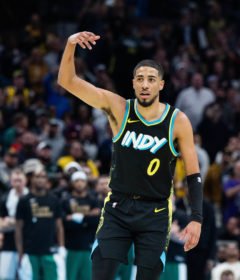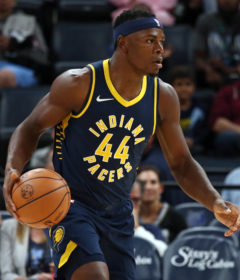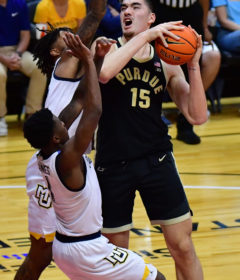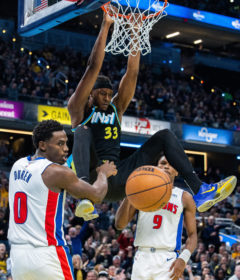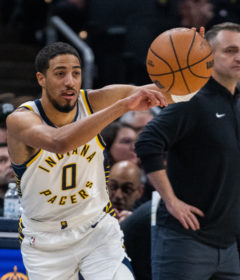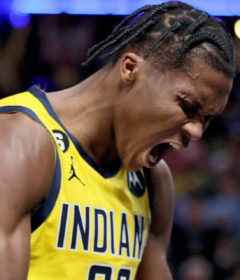2013 Playoffs: Seven questions on Pacers’ Game 7
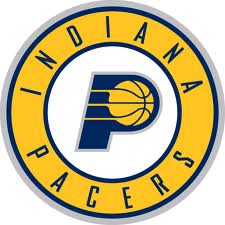
By CHRIS GOFF
ISL Correspondent
The Eastern Conference finals have produced just four Game 7s in the past 17 years. Well, here’s a good one to add to the collection. It’s the reigning champion Miami Heat versus the third-seeded Indiana Pacers. Win or go home. In 2005, the Heat were in this very same position – a conference finals Game 7 at AmericanAirlines Arena for the right to face the San Antonio Spurs in the NBA Finals – and failed. Oh, and Dwyane Wade was playing through a painful injury back then, too, to further the symmetry.
This one should be a heck of a showdown. Pacers coach Frank Vogel says, -Our approach is not, ‘If we lose, we’re out.’ Our approach is, ‘If we win, we get the Eastern Conference championship.’”
In that spirit, let’s answer seven questions about tonight’s Game 7 glare:
What does recent history indicate the game might look like?
The only Game 7 this spring, which came on May 4, resulted in quite a surprise. The visiting Bulls rampaged to a 17-point halftime lead at the Barclays Center before slaying the Nets 99-93. Last season, there were four Game 7s. The home team won three of those, and no final score was closer than nine points. In 2011, Oklahoma City beat the Grizzlies by 15 in the only Game 7. The last time the Pacers played one – in 2005’s first round – they routed Boston by 27 points in one of the biggest margins of victory ever in an NBA Game 7. In other words, the trend is toward one-sided outcomes.
How have road teams fared in the NBA’s previous Game 7s?
Not well. The home team has won 79.5 percent (89 of 112) of the Game 7s in the NBA playoffs. The Pacers are 2-3 in Game 7s, with all five contests played on the road, and the Heat are 3-3 in Game 7s, with two losses actually coming in Miami.
How long should Indiana’s starters play?
The easy trap to fall into would be to run them into the ground, given that the first five are a plus-49 when on the court together and all other Indy lineups are minus-54. That’s not advisable, though, because the Pacers will need their legs in the fourth quarter. Paul George needs to have an awesome game from start to finish. Miami has the luxury of playing in AmericanAirlines Arena because of its NBA-best 66 wins during the regular season. Indiana’s roster is thin on familiarity with the stresses of a Game 7, as David West and Sam Young are the only Pacers who have ever played in one. But the crowd will be a factor, and the emotion will wear on Indiana. Vogel should give each starter at least 5-6 minutes of rest.
How dominant has Roy Hibbert been?
Very. He’s averaging 22.8 points, 10.8 rebounds and 1.2 blocks through the series’ first six games. His surprisingly exceptional offense has carried the team this far but he’ll need help Monday night. The Pacers need George to be at his most assertive, Lance Stephenson to be at his most patient and George Hill to be at his most active. Undoubtedly, Hibbert has to be huge in a Game 7 on the road. He surely will. The questions lie with his shorter comrades. Hill has occasionally struggled to outplay Mario Chalmers. He simply has to outplay Chalmers in these circumstances. Elsewhere, George has an admirable quality in that he invites the pressure. His public goal is to be MVP of the league one day. A step in that direction would be a clutch response to this atmosphere.
What’s the key battle within the battle?
Rebounding. In the Pacers’ three losses, they have outrebounded Miami by just five, nine and one boards. In the Pacers’ three victories, their rebound edge was +7, +19 and +20. Dominating the glass is the main avenue to controlling the paint on both ends, as Indiana has done and must continue to do.
What will we see from The King?
LeBron James has appeared in three previous Game 7s – once in the conference finals, twice in the second round – and his team lost two of the three. In 2006, James scored 27 points in Cleveland’s 79-61 loss to Detroit. In 2008, James posted 45 points but Cleveland lost to Boston 97-91. Finally, James was on the winning side in 2012, when Miami advanced to the NBA Finals with a 101-88 victory over Boston in which James went off for 31 points and 12 rebounds. He’s a better player now than ever before, and he’ll do everything in his considerable power to tilt the scales in Miami’s favor.
Who will win?
Pacers move on after a close finish. The Heat simply haven’t shown much ability to run away from the Pacers with the exception of Game 3. And that was before center Chris Bosh got hurt. We’ve since learned how valuable Bosh is to the Heat’s offense. If two of the Big Three aren’t healthy enough to show up, the Pacers should win for the third time in four games to complete a series comeback. If it does come down to the wire, the Pacers’ end-game execution probably will leave them at a disadvantage. Miami has the championship know-how and the energy of the home crowd. But the Pacers are focused and hungry. They think they can win. It’s plausible that the Heat’s experience pays off. They’ve been here before. They’ve proven they can win big games when pushed against the wall. Miami’s injury situation is the telling red flag, however. With a right ankle twisted in Game 4 consistently causing mobility issues, Bosh will be playing his fourth game in seven days. Same goes for Wade; how much he can do on a useless right knee is a major question. I believe James needs a sidekick, and I don’t believe either Bosh or Wade is physically up to it. With two Heat stars nowhere near 100 percent, still sore and hurting, Miami needs Chalmers, Ray Allen and Shane Battier to be cooking from 3-point range and needs the defense to be a little tighter. At this point, none of that is likely. The Pacers have a great chance to beat a hobbled Heat team, one that they should be expected to take advantage of.

